University Academic and Employability Skills: A Self-Reflection
VerifiedAdded on 2020/05/28
|7
|1620
|518
Essay
AI Summary
This essay is a self-reflective analysis of a student's academic and employability skills, focusing on areas such as lecture comprehension, teamwork, presentation skills, and peer review. The student critiques their first semester experiences, identifying strengths in presentation and knowledge of cultural aspects, and weaknesses in focus during lectures and teamwork organization. The essay outlines an action plan to address these weaknesses, including note-taking strategies, improved teamwork approaches, and a focus on structured presentations and objective peer reviews. The student also reflects on the transition from college to university, acknowledging the increased competition and challenges in larger lecture settings, emphasizing the need for proactive learning strategies and self-improvement to enhance professional competency.
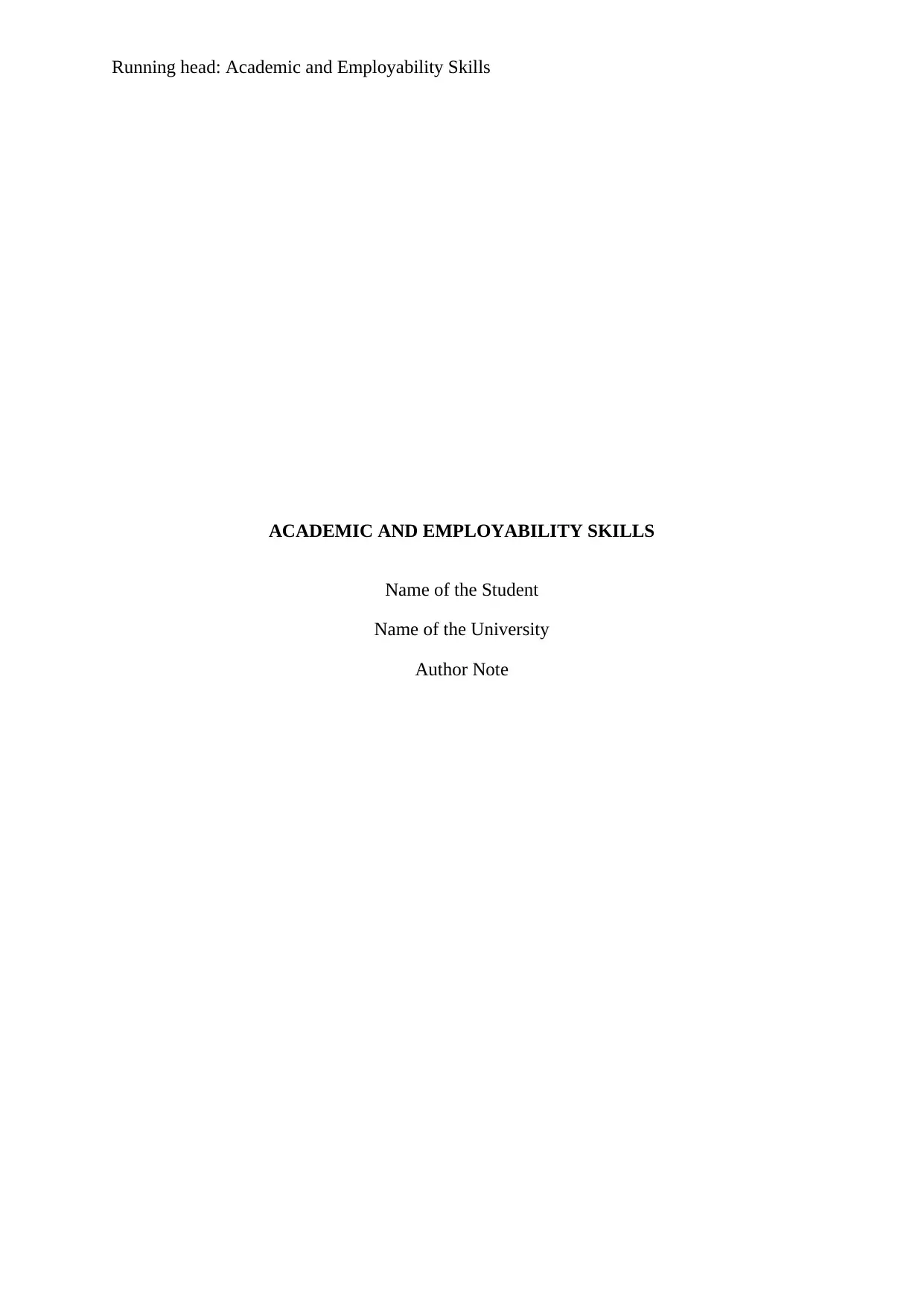
Running head: Academic and Employability Skills
ACADEMIC AND EMPLOYABILITY SKILLS
Name of the Student
Name of the University
Author Note
ACADEMIC AND EMPLOYABILITY SKILLS
Name of the Student
Name of the University
Author Note
Paraphrase This Document
Need a fresh take? Get an instant paraphrase of this document with our AI Paraphraser
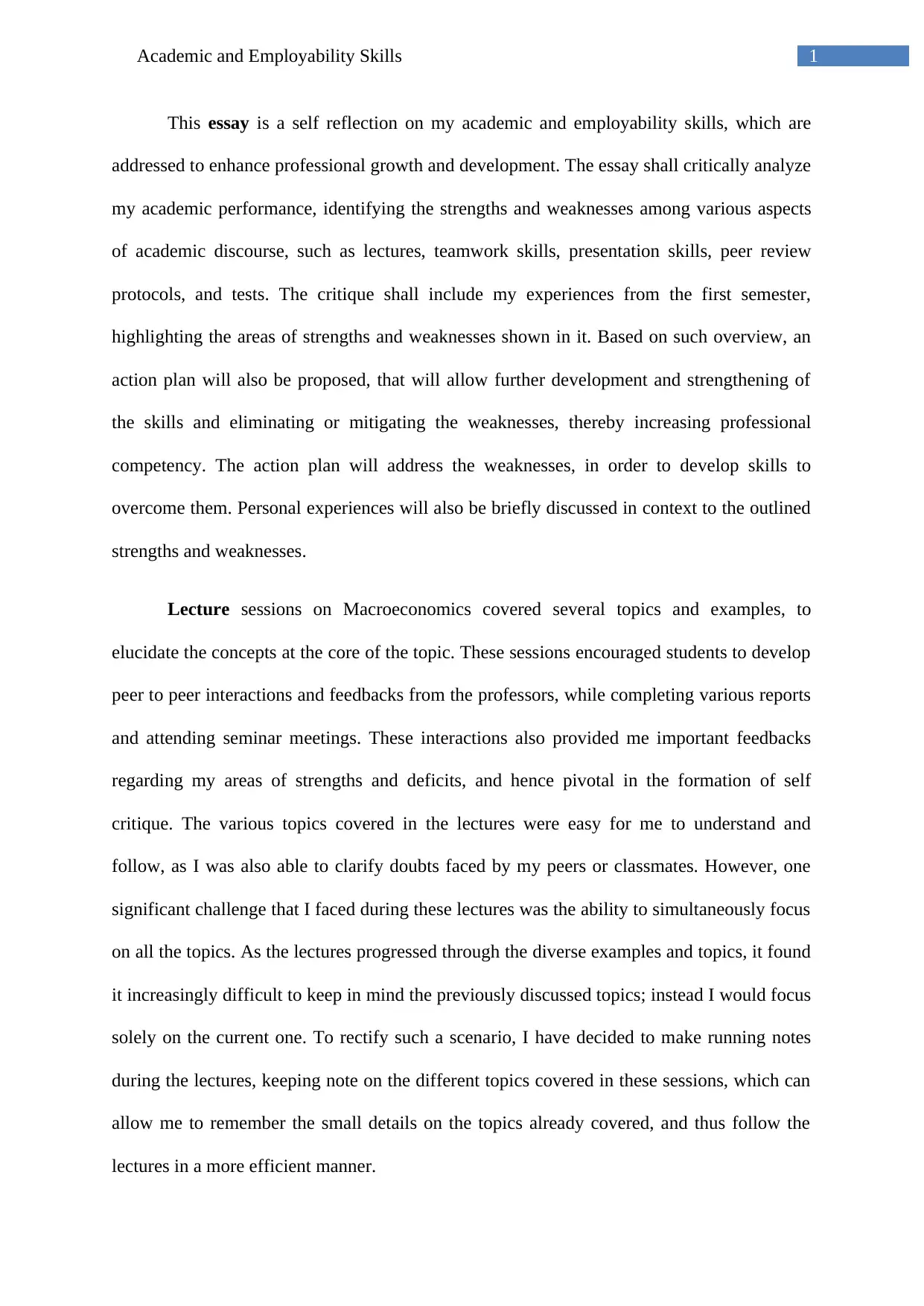
1Academic and Employability Skills
This essay is a self reflection on my academic and employability skills, which are
addressed to enhance professional growth and development. The essay shall critically analyze
my academic performance, identifying the strengths and weaknesses among various aspects
of academic discourse, such as lectures, teamwork skills, presentation skills, peer review
protocols, and tests. The critique shall include my experiences from the first semester,
highlighting the areas of strengths and weaknesses shown in it. Based on such overview, an
action plan will also be proposed, that will allow further development and strengthening of
the skills and eliminating or mitigating the weaknesses, thereby increasing professional
competency. The action plan will address the weaknesses, in order to develop skills to
overcome them. Personal experiences will also be briefly discussed in context to the outlined
strengths and weaknesses.
Lecture sessions on Macroeconomics covered several topics and examples, to
elucidate the concepts at the core of the topic. These sessions encouraged students to develop
peer to peer interactions and feedbacks from the professors, while completing various reports
and attending seminar meetings. These interactions also provided me important feedbacks
regarding my areas of strengths and deficits, and hence pivotal in the formation of self
critique. The various topics covered in the lectures were easy for me to understand and
follow, as I was also able to clarify doubts faced by my peers or classmates. However, one
significant challenge that I faced during these lectures was the ability to simultaneously focus
on all the topics. As the lectures progressed through the diverse examples and topics, it found
it increasingly difficult to keep in mind the previously discussed topics; instead I would focus
solely on the current one. To rectify such a scenario, I have decided to make running notes
during the lectures, keeping note on the different topics covered in these sessions, which can
allow me to remember the small details on the topics already covered, and thus follow the
lectures in a more efficient manner.
This essay is a self reflection on my academic and employability skills, which are
addressed to enhance professional growth and development. The essay shall critically analyze
my academic performance, identifying the strengths and weaknesses among various aspects
of academic discourse, such as lectures, teamwork skills, presentation skills, peer review
protocols, and tests. The critique shall include my experiences from the first semester,
highlighting the areas of strengths and weaknesses shown in it. Based on such overview, an
action plan will also be proposed, that will allow further development and strengthening of
the skills and eliminating or mitigating the weaknesses, thereby increasing professional
competency. The action plan will address the weaknesses, in order to develop skills to
overcome them. Personal experiences will also be briefly discussed in context to the outlined
strengths and weaknesses.
Lecture sessions on Macroeconomics covered several topics and examples, to
elucidate the concepts at the core of the topic. These sessions encouraged students to develop
peer to peer interactions and feedbacks from the professors, while completing various reports
and attending seminar meetings. These interactions also provided me important feedbacks
regarding my areas of strengths and deficits, and hence pivotal in the formation of self
critique. The various topics covered in the lectures were easy for me to understand and
follow, as I was also able to clarify doubts faced by my peers or classmates. However, one
significant challenge that I faced during these lectures was the ability to simultaneously focus
on all the topics. As the lectures progressed through the diverse examples and topics, it found
it increasingly difficult to keep in mind the previously discussed topics; instead I would focus
solely on the current one. To rectify such a scenario, I have decided to make running notes
during the lectures, keeping note on the different topics covered in these sessions, which can
allow me to remember the small details on the topics already covered, and thus follow the
lectures in a more efficient manner.
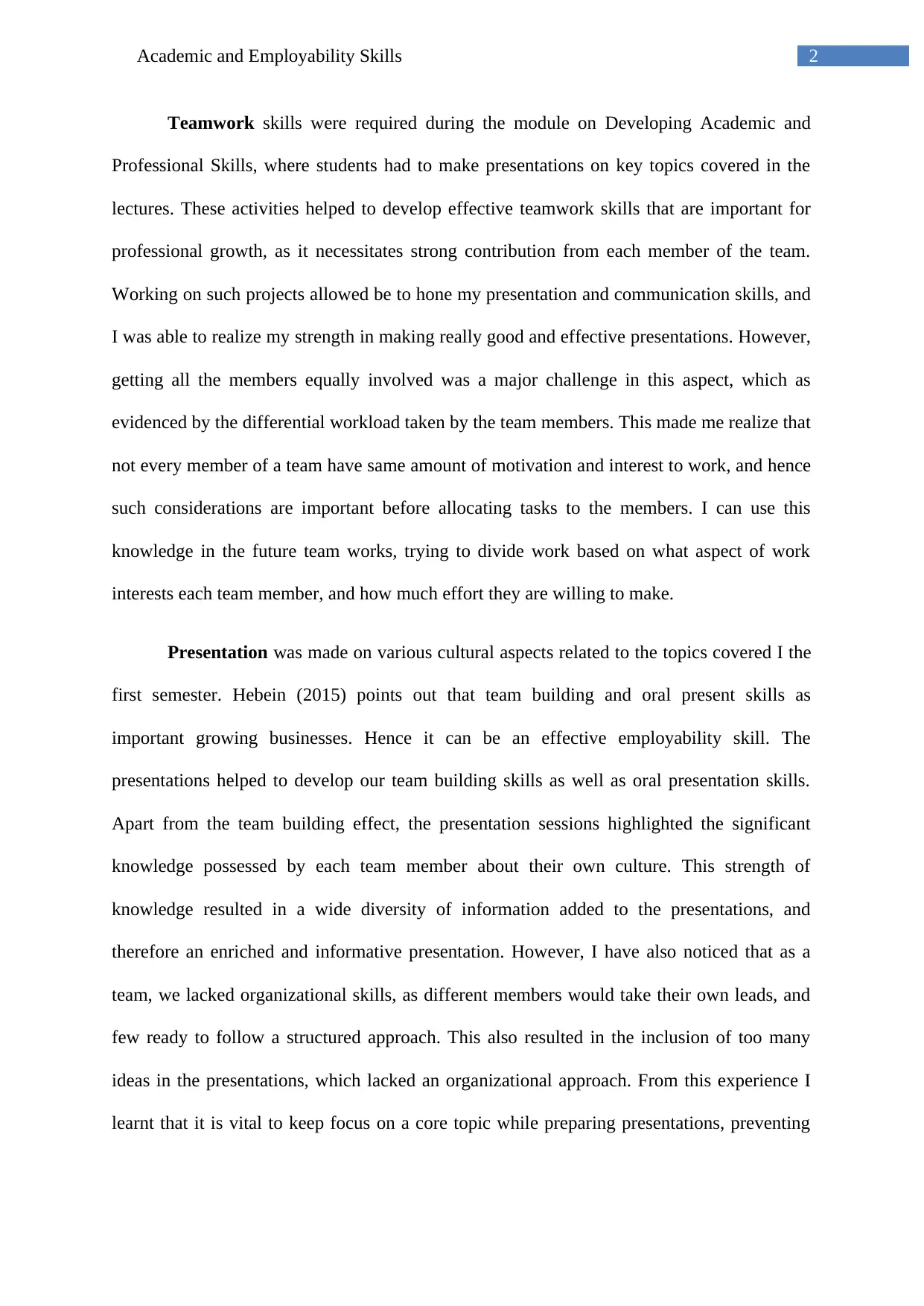
2Academic and Employability Skills
Teamwork skills were required during the module on Developing Academic and
Professional Skills, where students had to make presentations on key topics covered in the
lectures. These activities helped to develop effective teamwork skills that are important for
professional growth, as it necessitates strong contribution from each member of the team.
Working on such projects allowed be to hone my presentation and communication skills, and
I was able to realize my strength in making really good and effective presentations. However,
getting all the members equally involved was a major challenge in this aspect, which as
evidenced by the differential workload taken by the team members. This made me realize that
not every member of a team have same amount of motivation and interest to work, and hence
such considerations are important before allocating tasks to the members. I can use this
knowledge in the future team works, trying to divide work based on what aspect of work
interests each team member, and how much effort they are willing to make.
Presentation was made on various cultural aspects related to the topics covered I the
first semester. Hebein (2015) points out that team building and oral present skills as
important growing businesses. Hence it can be an effective employability skill. The
presentations helped to develop our team building skills as well as oral presentation skills.
Apart from the team building effect, the presentation sessions highlighted the significant
knowledge possessed by each team member about their own culture. This strength of
knowledge resulted in a wide diversity of information added to the presentations, and
therefore an enriched and informative presentation. However, I have also noticed that as a
team, we lacked organizational skills, as different members would take their own leads, and
few ready to follow a structured approach. This also resulted in the inclusion of too many
ideas in the presentations, which lacked an organizational approach. From this experience I
learnt that it is vital to keep focus on a core topic while preparing presentations, preventing
Teamwork skills were required during the module on Developing Academic and
Professional Skills, where students had to make presentations on key topics covered in the
lectures. These activities helped to develop effective teamwork skills that are important for
professional growth, as it necessitates strong contribution from each member of the team.
Working on such projects allowed be to hone my presentation and communication skills, and
I was able to realize my strength in making really good and effective presentations. However,
getting all the members equally involved was a major challenge in this aspect, which as
evidenced by the differential workload taken by the team members. This made me realize that
not every member of a team have same amount of motivation and interest to work, and hence
such considerations are important before allocating tasks to the members. I can use this
knowledge in the future team works, trying to divide work based on what aspect of work
interests each team member, and how much effort they are willing to make.
Presentation was made on various cultural aspects related to the topics covered I the
first semester. Hebein (2015) points out that team building and oral present skills as
important growing businesses. Hence it can be an effective employability skill. The
presentations helped to develop our team building skills as well as oral presentation skills.
Apart from the team building effect, the presentation sessions highlighted the significant
knowledge possessed by each team member about their own culture. This strength of
knowledge resulted in a wide diversity of information added to the presentations, and
therefore an enriched and informative presentation. However, I have also noticed that as a
team, we lacked organizational skills, as different members would take their own leads, and
few ready to follow a structured approach. This also resulted in the inclusion of too many
ideas in the presentations, which lacked an organizational approach. From this experience I
learnt that it is vital to keep focus on a core topic while preparing presentations, preventing
⊘ This is a preview!⊘
Do you want full access?
Subscribe today to unlock all pages.

Trusted by 1+ million students worldwide
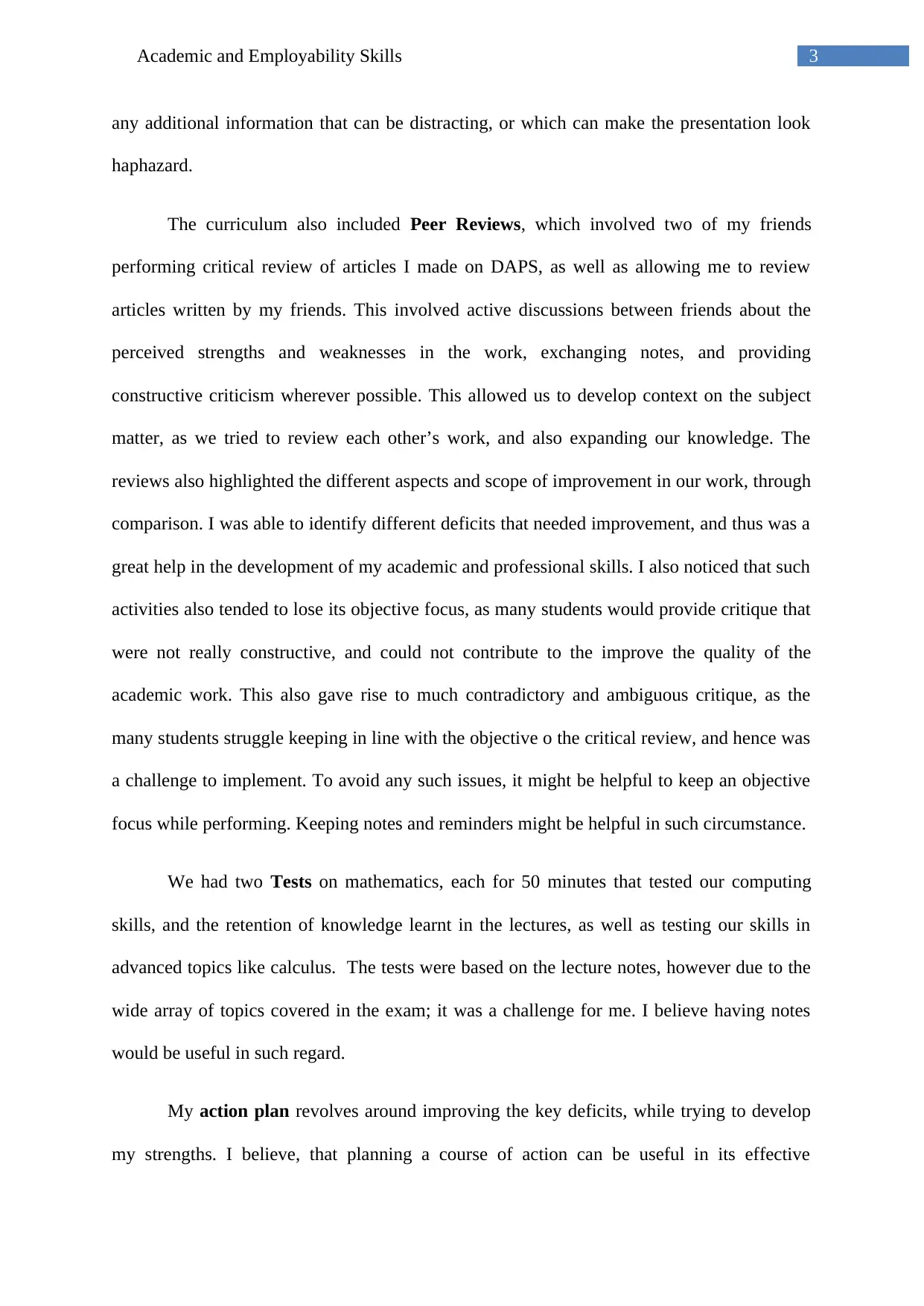
3Academic and Employability Skills
any additional information that can be distracting, or which can make the presentation look
haphazard.
The curriculum also included Peer Reviews, which involved two of my friends
performing critical review of articles I made on DAPS, as well as allowing me to review
articles written by my friends. This involved active discussions between friends about the
perceived strengths and weaknesses in the work, exchanging notes, and providing
constructive criticism wherever possible. This allowed us to develop context on the subject
matter, as we tried to review each other’s work, and also expanding our knowledge. The
reviews also highlighted the different aspects and scope of improvement in our work, through
comparison. I was able to identify different deficits that needed improvement, and thus was a
great help in the development of my academic and professional skills. I also noticed that such
activities also tended to lose its objective focus, as many students would provide critique that
were not really constructive, and could not contribute to the improve the quality of the
academic work. This also gave rise to much contradictory and ambiguous critique, as the
many students struggle keeping in line with the objective o the critical review, and hence was
a challenge to implement. To avoid any such issues, it might be helpful to keep an objective
focus while performing. Keeping notes and reminders might be helpful in such circumstance.
We had two Tests on mathematics, each for 50 minutes that tested our computing
skills, and the retention of knowledge learnt in the lectures, as well as testing our skills in
advanced topics like calculus. The tests were based on the lecture notes, however due to the
wide array of topics covered in the exam; it was a challenge for me. I believe having notes
would be useful in such regard.
My action plan revolves around improving the key deficits, while trying to develop
my strengths. I believe, that planning a course of action can be useful in its effective
any additional information that can be distracting, or which can make the presentation look
haphazard.
The curriculum also included Peer Reviews, which involved two of my friends
performing critical review of articles I made on DAPS, as well as allowing me to review
articles written by my friends. This involved active discussions between friends about the
perceived strengths and weaknesses in the work, exchanging notes, and providing
constructive criticism wherever possible. This allowed us to develop context on the subject
matter, as we tried to review each other’s work, and also expanding our knowledge. The
reviews also highlighted the different aspects and scope of improvement in our work, through
comparison. I was able to identify different deficits that needed improvement, and thus was a
great help in the development of my academic and professional skills. I also noticed that such
activities also tended to lose its objective focus, as many students would provide critique that
were not really constructive, and could not contribute to the improve the quality of the
academic work. This also gave rise to much contradictory and ambiguous critique, as the
many students struggle keeping in line with the objective o the critical review, and hence was
a challenge to implement. To avoid any such issues, it might be helpful to keep an objective
focus while performing. Keeping notes and reminders might be helpful in such circumstance.
We had two Tests on mathematics, each for 50 minutes that tested our computing
skills, and the retention of knowledge learnt in the lectures, as well as testing our skills in
advanced topics like calculus. The tests were based on the lecture notes, however due to the
wide array of topics covered in the exam; it was a challenge for me. I believe having notes
would be useful in such regard.
My action plan revolves around improving the key deficits, while trying to develop
my strengths. I believe, that planning a course of action can be useful in its effective
Paraphrase This Document
Need a fresh take? Get an instant paraphrase of this document with our AI Paraphraser
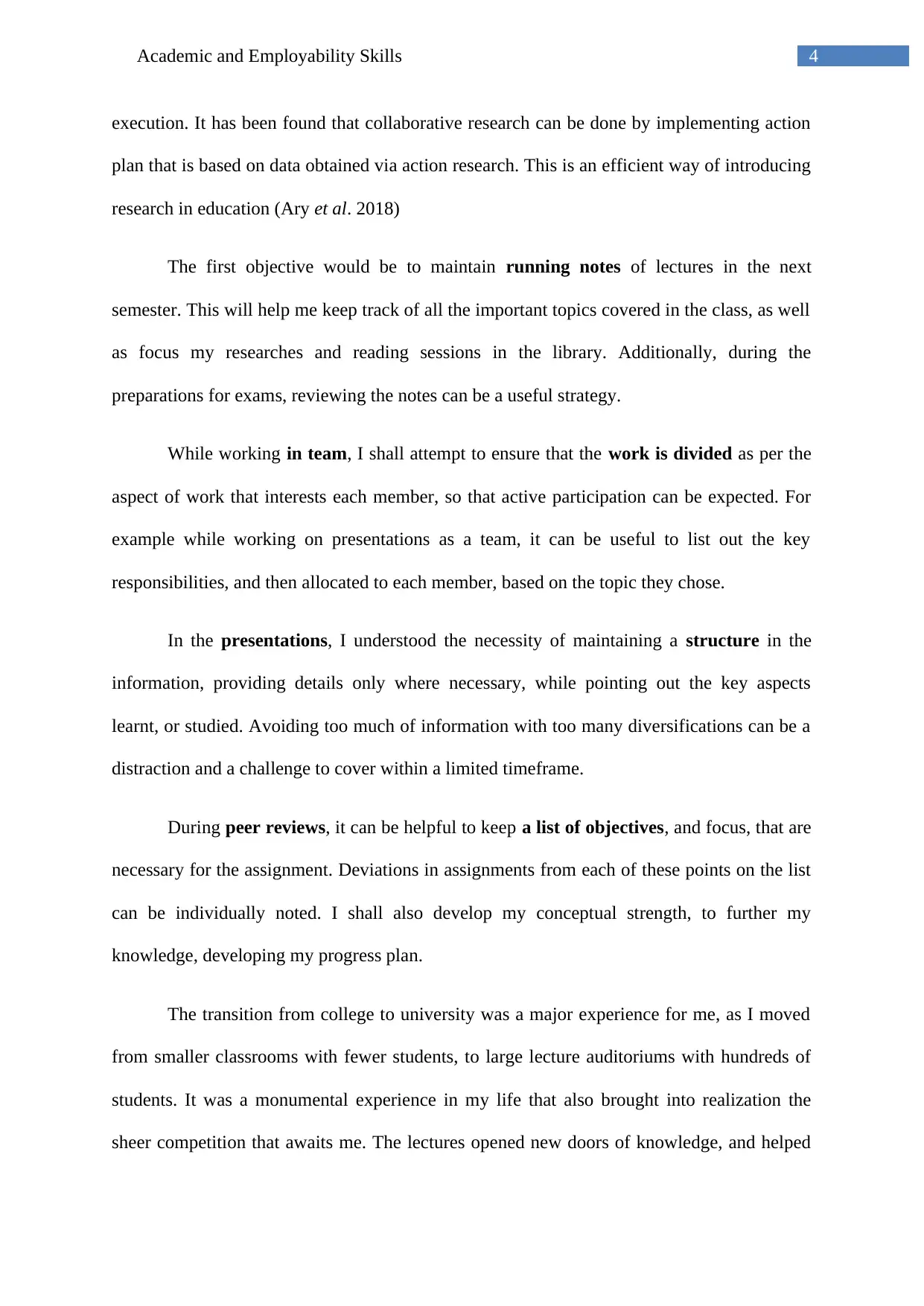
4Academic and Employability Skills
execution. It has been found that collaborative research can be done by implementing action
plan that is based on data obtained via action research. This is an efficient way of introducing
research in education (Ary et al. 2018)
The first objective would be to maintain running notes of lectures in the next
semester. This will help me keep track of all the important topics covered in the class, as well
as focus my researches and reading sessions in the library. Additionally, during the
preparations for exams, reviewing the notes can be a useful strategy.
While working in team, I shall attempt to ensure that the work is divided as per the
aspect of work that interests each member, so that active participation can be expected. For
example while working on presentations as a team, it can be useful to list out the key
responsibilities, and then allocated to each member, based on the topic they chose.
In the presentations, I understood the necessity of maintaining a structure in the
information, providing details only where necessary, while pointing out the key aspects
learnt, or studied. Avoiding too much of information with too many diversifications can be a
distraction and a challenge to cover within a limited timeframe.
During peer reviews, it can be helpful to keep a list of objectives, and focus, that are
necessary for the assignment. Deviations in assignments from each of these points on the list
can be individually noted. I shall also develop my conceptual strength, to further my
knowledge, developing my progress plan.
The transition from college to university was a major experience for me, as I moved
from smaller classrooms with fewer students, to large lecture auditoriums with hundreds of
students. It was a monumental experience in my life that also brought into realization the
sheer competition that awaits me. The lectures opened new doors of knowledge, and helped
execution. It has been found that collaborative research can be done by implementing action
plan that is based on data obtained via action research. This is an efficient way of introducing
research in education (Ary et al. 2018)
The first objective would be to maintain running notes of lectures in the next
semester. This will help me keep track of all the important topics covered in the class, as well
as focus my researches and reading sessions in the library. Additionally, during the
preparations for exams, reviewing the notes can be a useful strategy.
While working in team, I shall attempt to ensure that the work is divided as per the
aspect of work that interests each member, so that active participation can be expected. For
example while working on presentations as a team, it can be useful to list out the key
responsibilities, and then allocated to each member, based on the topic they chose.
In the presentations, I understood the necessity of maintaining a structure in the
information, providing details only where necessary, while pointing out the key aspects
learnt, or studied. Avoiding too much of information with too many diversifications can be a
distraction and a challenge to cover within a limited timeframe.
During peer reviews, it can be helpful to keep a list of objectives, and focus, that are
necessary for the assignment. Deviations in assignments from each of these points on the list
can be individually noted. I shall also develop my conceptual strength, to further my
knowledge, developing my progress plan.
The transition from college to university was a major experience for me, as I moved
from smaller classrooms with fewer students, to large lecture auditoriums with hundreds of
students. It was a monumental experience in my life that also brought into realization the
sheer competition that awaits me. The lectures opened new doors of knowledge, and helped
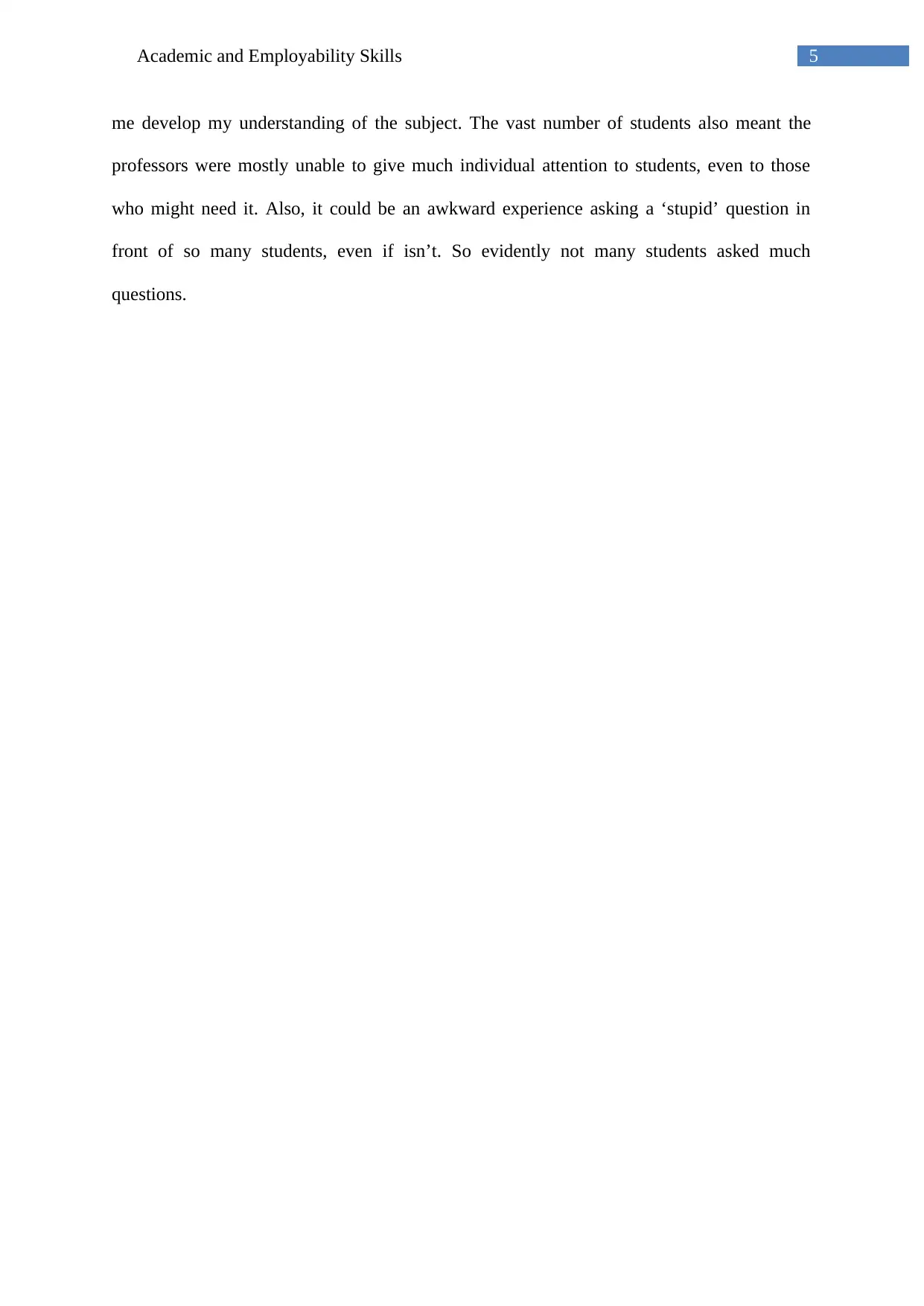
5Academic and Employability Skills
me develop my understanding of the subject. The vast number of students also meant the
professors were mostly unable to give much individual attention to students, even to those
who might need it. Also, it could be an awkward experience asking a ‘stupid’ question in
front of so many students, even if isn’t. So evidently not many students asked much
questions.
me develop my understanding of the subject. The vast number of students also meant the
professors were mostly unable to give much individual attention to students, even to those
who might need it. Also, it could be an awkward experience asking a ‘stupid’ question in
front of so many students, even if isn’t. So evidently not many students asked much
questions.
⊘ This is a preview!⊘
Do you want full access?
Subscribe today to unlock all pages.

Trusted by 1+ million students worldwide
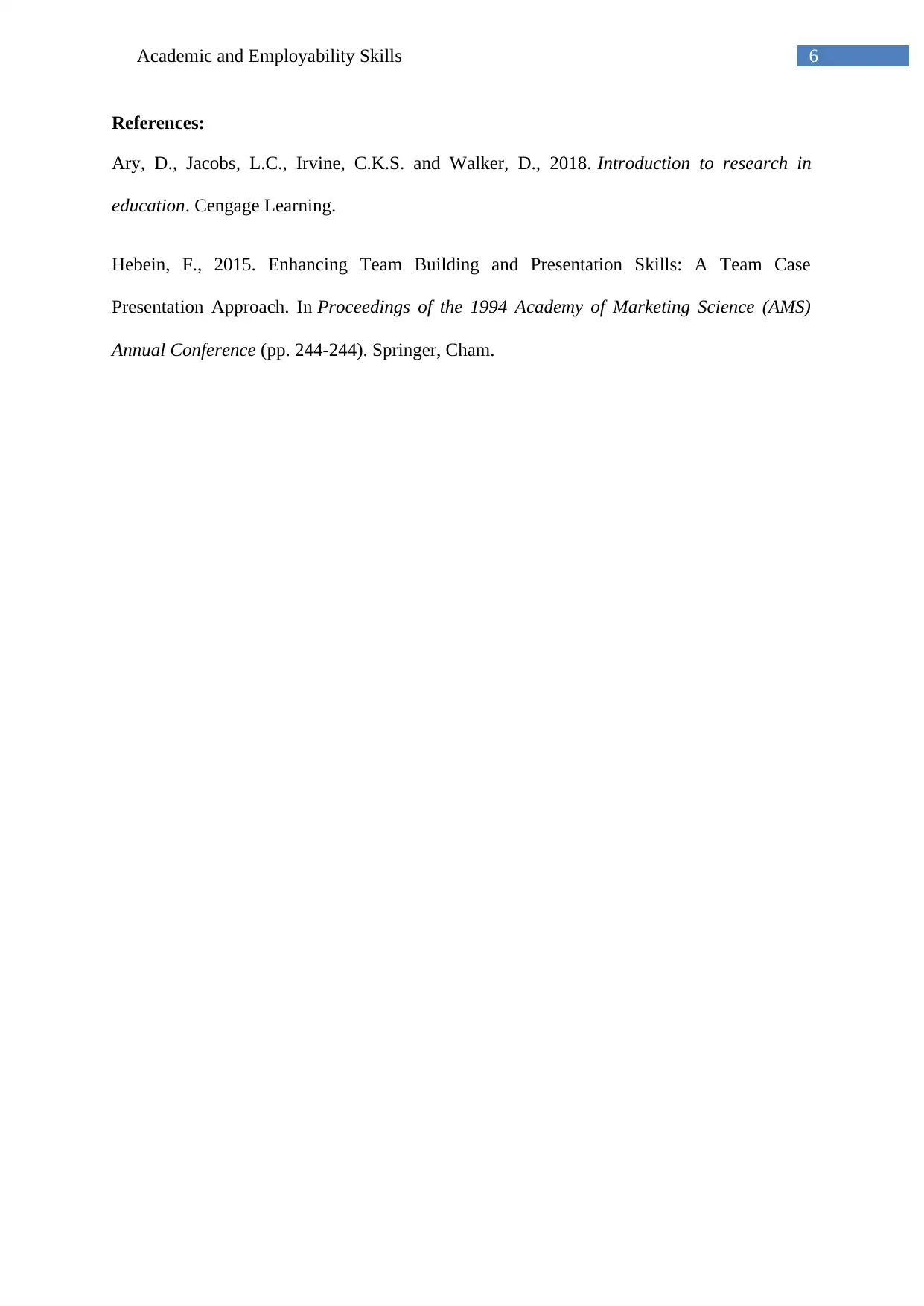
6Academic and Employability Skills
References:
Ary, D., Jacobs, L.C., Irvine, C.K.S. and Walker, D., 2018. Introduction to research in
education. Cengage Learning.
Hebein, F., 2015. Enhancing Team Building and Presentation Skills: A Team Case
Presentation Approach. In Proceedings of the 1994 Academy of Marketing Science (AMS)
Annual Conference (pp. 244-244). Springer, Cham.
References:
Ary, D., Jacobs, L.C., Irvine, C.K.S. and Walker, D., 2018. Introduction to research in
education. Cengage Learning.
Hebein, F., 2015. Enhancing Team Building and Presentation Skills: A Team Case
Presentation Approach. In Proceedings of the 1994 Academy of Marketing Science (AMS)
Annual Conference (pp. 244-244). Springer, Cham.
1 out of 7
Related Documents
Your All-in-One AI-Powered Toolkit for Academic Success.
+13062052269
info@desklib.com
Available 24*7 on WhatsApp / Email
![[object Object]](/_next/static/media/star-bottom.7253800d.svg)
Unlock your academic potential
Copyright © 2020–2026 A2Z Services. All Rights Reserved. Developed and managed by ZUCOL.




